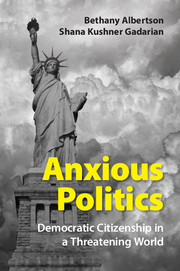Book contents
- Frontmatter
- Dedication
- Contents
- List of Tables
- List of Figures
- Acknowledgments
- Prologue
- 1 Anxiety in Democratic Life
- 2 What's Your Worry?: Finding and Creating Anxiety in the American Public
- 3 Anxiety, Immigration, and the Search for Information
- 4 Don't Worry, Be Trusting?: The Effect of Anxiety on Political Trust
- 5 The Politics of Anxiety: Anxiety's Role in Public Opinion
- 6 Anxiety and Democratic Citizenship
- Appendix
- References
- Index
3 - Anxiety, Immigration, and the Search for Information
Published online by Cambridge University Press: 05 September 2015
- Frontmatter
- Dedication
- Contents
- List of Tables
- List of Figures
- Acknowledgments
- Prologue
- 1 Anxiety in Democratic Life
- 2 What's Your Worry?: Finding and Creating Anxiety in the American Public
- 3 Anxiety, Immigration, and the Search for Information
- 4 Don't Worry, Be Trusting?: The Effect of Anxiety on Political Trust
- 5 The Politics of Anxiety: Anxiety's Role in Public Opinion
- 6 Anxiety and Democratic Citizenship
- Appendix
- References
- Index
Summary
The ability of the press to present us with bad news, with news meant to disquiet us, though unpleasant … serves us well.
George Marcus, The Sentimental Citizen (2002)Fear is the most powerful enemy of reason.
Al Gore, The Assault on Reason (2007)How does anxiety affect information processing? We argue that anxious citizens are motivated to seek political information but are attracted to threatening news. Anxiety serves to motivate learning by increasing interest, the desire for information, and information gathering itself (Brader 2005, 2006; Gross 2009; Marcus and MacKuen 1993; Marcus, Neuman, and MacKuen 2000). In a public where the average person has little factual knowledge about politics (Delli Carpini and Keeter 1996), political appeals that increase individuals’ anxiety can increase political knowledge and help people come closer to the democratic ideal of engaged citizens. Previous research finds that anxiety motivates citizens to learn about politics, but the act of simply gathering more information may not necessarily create better democratic citizens. We know very little about the kind of information that anxious citizens pay attention to or how they engage with political information. If anxious citizens seek more information but demonstrate biases in information processing, then the consequences of anxiety for citizen learning are more complex than suggested by political commentators and previous work on emotion and politics.
In the realm of politics, some issues may be inherently threatening, whereas others are framed threats and may be made threatening by news media and strategic campaigns. The contemporary political debate over undocumented immigration in the United States is infused with these framed threats – the threat that “illegals” pose to Americans’ economic well-being, their security, and their way of life are all evident in campaign advertisements and candidate speeches. Politicians, political pundits, and some political thinkers regularly sound alarm bells about the dire effects of immigration on the economic health and cultural fabric of the United States (Borjas 1999; Huntington 2004). To test the consequences of anxiety on political learning, we use Immigration KN Study 2007. The American public is torn on immigration policy, but a significant portion of the public believes that immigrants, particularly undocumented immigrants, burden the country's economy and social system (Pew Research Center for the People and the Press 2006c) and worry about the consequences of immigration. Our hypothesis testing in this chapter is confined to the immigration study, but we expect that same dynamics would play out across other issue areas.
- Type
- Chapter
- Information
- Anxious PoliticsDemocratic Citizenship in a Threatening World, pp. 43 - 72Publisher: Cambridge University PressPrint publication year: 2015



